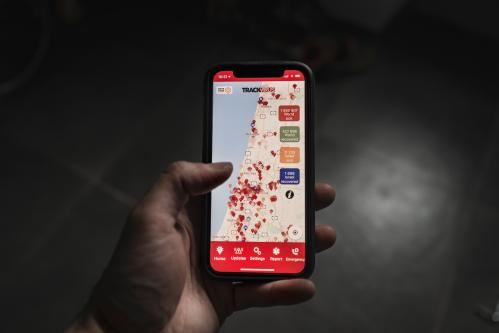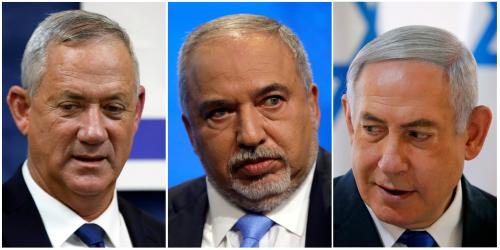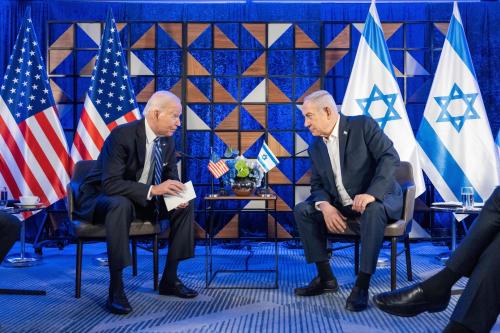On the face of it, the deal announced by President Donald Trump on the normalization of Israel-United Arab Emirates (UAE) ties was something that his administration can claim as an achievement. From the point of view of the administration’s project in the Middle East, it is. Less obvious is that the prospect of Joe Biden being the next president of the United States also had something to do with it, as uniform Democratic opposition to Israeli plans to annex parts of the West Bank was key in the calculus.
Let’s be clear: The UAE and Israel have had expanding cooperative relations for some time, including in intelligence, technology, military, business, and politics. Both governments have been close allies of the Trump administration — and both may still have an interest in seeing Trump re-elected in November.
But leaders in Israel and the UAE also read the polls, and know that the odds are that Joe Biden is likely to win the White House in November. It’s even possible that the Democrats may regain control of the Senate.
As with all members of the Arab League, the United Arab Emirates had supported the Arab Peace Initiative, which is still the consensus position of the Arab states: It offers full diplomatic relations with Israel in exchange for Israeli withdrawal from the territories occupied in 1967.
Israel’s plans to annex parts of the West Bank were a big potential headache for Arab states, beyond their presumed support for the Palestinians. The Arab states’ position in support of two states, like the American and international position, has served as a psychological trick to pretend that Israeli occupation remains temporary, and that — as long as there was no formal annexation of territories — expansion of Israeli control and settlement remain reversible. Annexation would have made the Arab and international position untenable, which is why there was strong opposition to it across the board. It was less about ending the occupation of Palestinians, and more about avoiding even more of a headache.
The UAE, which had already scored points in Israel through its warming relationship, was vocal in its opposition to annexation. Its ambassador to Washington, Yousef Al Otaiba, penned an article in an Israeli newspaper saying it’s either normalization or annexation. Less noticed was that Al Otaiba did not say “it’s either ending occupation or normalization,” which has been the consensus Arab position. But the UAE scored brownie points internationally, and even among Democrats in the U.S.
In some ways, the article was a break with the full support that the UAE has lent the Trump administration, as annexation is a featured part of its plan for the Middle East. But the act itself, an Arab ambassador writing in an Israeli newspaper, pledging peace, was also seen as an act of normalization, thus softening the blow. Among Democrats in the U.S. — who uniformly opposed annexation, with some in Congress linking it to aid to Israel — the UAE intervention was a welcome move. Presumed presidential nominee Joe Biden also strongly opposed annexation.
Israeli Prime Minister Benjamin Netanyahu had already frozen his anticipated annexation moves, originally expected in July. Much of what’s happening in Israel is connected to internal politics in a messy political environment, in which an indicted Netanyahu faces legal trouble and Israel may be approaching a fourth election (its last election in March was its third inconclusive election within a year). At the same time, Israelis are always watching the most critical backer, the United States.
Had Netanyahu moved to annex parts of the West Bank in the coming months, his government would have started its relationship with a possible new Democratic administration on the wrong foot, even as the Biden-Harris ticket seems palatable to Israel on issues pertaining to Israel-Palestine. The fact is that the Democratic party has moved on this issue, as even pro-Israel members of Congress opposed annexation, Democratic constituents are to the left of Biden-Harris on this issue, and congressional Democrats who are far more critical of Israel have shown electoral muscle in recent primaries.
The agreement with the UAE helps Netanyahu justify his suspension of annexation to hardliners, even though he was already moving in that direction anyway, and more because of the prospect of Democrats winning in November than because the UAE offered official normalization. Still, the prize for Israel is big: Efforts to normalize ties with Arab states have principally focused on Saudi Arabia, because of its financial and political clout, but secondarily on the UAE because it is wealthy and influential, and because it is a possible back door to Saudi Arabia. And, as Israel’s interests in confronting Iran matches that of the UAE, more access to one of Iran’s neighbors — which has robust trade relations with Tehran — gives Israel new levers.
Israel’s suspension of annexation provides a fig leaf for the UAE move that it hopes will mitigate Palestinian and other Arab states’ reactions, and it has likely cleared the move with some of its Arab allies already. But the UAE has something to gain too, and it has a lot to do with Washington — for the Emirates, this deal was not really about the Palestinians.
Certainly, the UAE scores points with the Trump administration, as it gives the White House a perceived foreign policy success in the final months of an election campaign. But most congressional Democrats — relieved that annexation is off the table for now, and always calling for Arab normalization with Israel in any case — will also generally applaud the move. This comes at a time when the UAE is not only seen as a Trump ally, but also as one of the Saudi-led coalition partners in the Yemen war, which has drawn significant criticism in Congress. If, as polls indicate, Biden becomes the next president, the UAE has put itself on a path that mitigates the strikes against it among Democrats. Keep in mind that both Israel and the UAE would expect a Biden administration to have an Iran policy closer to Obama’s than to Trump’s, which would concern both countries, even aside from other issues.
In their strong and unanimous opposition to annexation, including by Joe Biden, and in the message they sent in recent primaries, Democrats can claim much of the credit for stopping annexation. The fear, however, is that the Democrats’ comfort could lead to complacency. Israeli normalization with Arabs states is taking place without real progress toward Israeli-Palestinian peace. That, coupled with Israel taking annexation off the table for now, could help reinforce a terrible status quo, especially for the Palestinians, instead of pushing to end the 53-year-old Israeli occupation.







Commentary
The Biden factor in the UAE-Israel deal
August 15, 2020